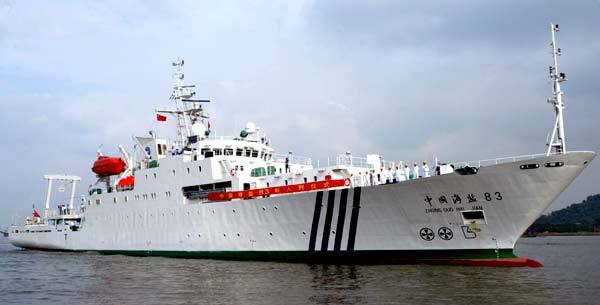Nation merging maritime patrol forces
 0 Comment(s)
0 Comment(s) Print
Print E-mail China Daily, March 11, 2013
E-mail China Daily, March 11, 2013
China's top oceanic administration will be restructured in a move to strengthen maritime law enforcement and better protect marine resources amid tense territorial disputes with neighboring countries.
 |
|
China's marine surveillance ship [file photo] |
The plan, which was unveiled on Sunday, will put China's maritime law enforcement forces, currently scattered over multiple ministries, under a single administration, State Councilor Ma Kai said at the annual session of the top legislature.
Experts said the restructuring addresses China's urgent concerns to secure and utilize its marine resources and protect its waters.
The restructured agency, which will retain the name of the State Oceanic Administration, now unifies the coast guard forces of the Ministry of Public Security, the fisheries law enforcement command of the Ministry of Agriculture, and the maritime anti-smuggling authorities of the General Administration of Customs.
Details of the restructuring were released in Ma's report about the overall organizational restructuring of the State Council, China's cabinet.
The SOA currently has only one maritime law enforcement agency, the China Marine Surveillance, and has a shortage of personnel and equipment to patrol more than 18,000 kilometers of the nation's coastline and its 3 million square kilometers of territorial water.
The law enforcement agency of the expanded administration will be called the Maritime Police Bureau, Ma said. Analysts said law enforcement vessels currently painted with various ministerial logos will fall under the bureau, a Chinese version of the coast guard.
Under the restructuring, a high-level consultative and coordinating body, the National Oceanic Commission, will be established to create oceanic development strategies, Ma said.
The SOA will continue to be administered by the Ministry of Land and Resources.
Restructuring the oceanic administration is in line with China's need for faster economic development and safeguarding maritime rights, said Xu Shaoshi, minister of land and resources.
Niu Dun, vice-minister of agriculture and also a member of China's top advisory body, said there are more than 20 million people working in the fishing industry. Fishermen, Niu said, are a vulnerable group that needs the government's protection.
Chinese fishermen have in recent years been illegally expelled or detained by countries that have sea disputes with China.
"The move signals the government's efforts to address these people's concerns because the enforcement of the maritime forces will provide a safer environment for fishery production and maritime economy," Niu said.
Li Guoqiang, deputy director of the Research Center for Chinese Borderland History and Geography under the Chinese Academy of Social Sciences, said that the restructuring is not directed against any specific country nor any specific dispute.





